In the midst of the COVID-19 pandemic, more employees are working remotely and, depending on the industry and the health of the employer, their jobs might be significantly altered—either now or in the next couple of years. Therefore, the definition of meaningful work will evolve along with the organization. Leaders must be able to connect with their team members who may be more dispersed than ever before in a way that creates a sense of shared purpose and collaborative vision. Collaborative technologies are evolving quickly, but organizations must embrace the concept that people always need social interactions, not just during the pandemic.
Managers must create strong connections with each of their employees and focus on short- and long-term goals that will help them reach their career goals while meeting the needs of the business. Setting specific expectations and enabling employees to reach them through flexible work schedules (as the role allows), connections with peers, the right work tools, and frequent feedback and coaching will empower employees, drive productivity, and help them see that their work is meaningful to both themselves and the business.
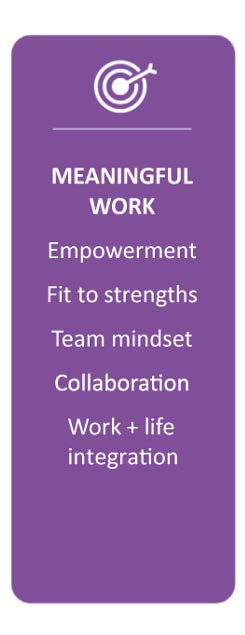
The pandemic has thrown the slow evolution to continuous, performance-focused learning into overdrive. In just a few short weeks since the move to remote work, for example, use of video learning and e-learning grew from 11 percent of organizations to more than 70 percent. Organizations mustn’t fall back into an over-reliance on live instructor-based learning, especially since remote workers likely will remain a far higher percentage of the workforce than before.
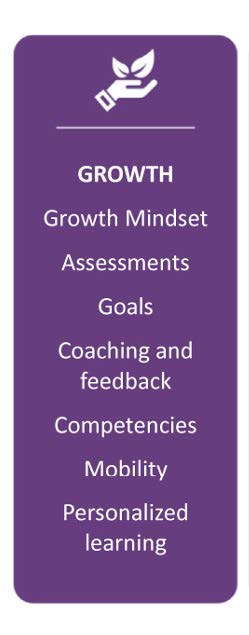
In addition, the increasingly dispersed workforces will need coaching and feedback to improve performance in a fast-changing environment, and that will have to be done through digital tools. Career discussions also must continue and must be enabled by technology to have an impact across the remote workforce.
As the workforce evolves after COVID-19, the failed top-down leadership model will fade away. With more dispersed workforces comes the need for team-centered, shared leadership across the enterprise. Leaders need to be developed at all levels, which is what we mean by democratization. Leaders must be more collaborators than decision-makers, empowering people with the right skills and competencies to work together to solve challenges. This takes a combination of digital-age competencies that includes courage, empathy, optimism, innovation, and humility. Only through the inclusion of diverse talent across the enterprise can businesses succeed in the future world of work.
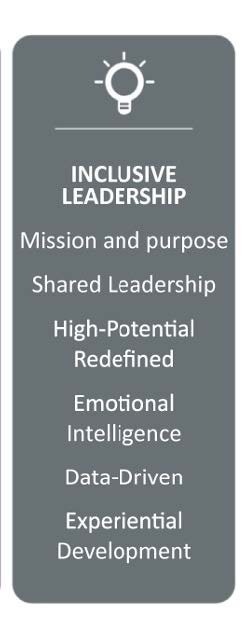
We are in the midst of unprecedented change. Employees will be expected to adapt and thrive amid eternal disruption. Many organizations have done an excellent job of focusing on employees’ wellness and well-being. Those efforts must continue as we adapt to the new normal.
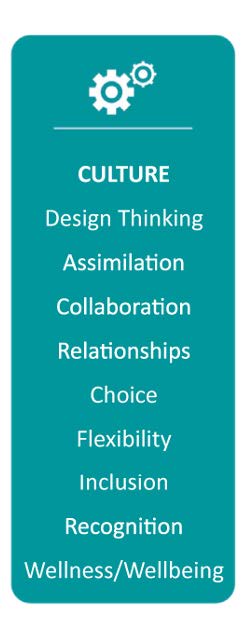
This goes beyond simply offering programs and services, but also designing a more dispersed work environment that still can empower employees to be productive while leading healthy, full lives. Employers struggled with this when there was a natural separation between work and home, but now they will increasingly exist in the same space. There will be a need for flexibility and understanding, to listen to concerns and suggestions and regularly recognize and appreciate meaningful contributors and behaviors that represent the values and goals of the organization.
Collaborative technologies enable this type of inclusive culture, but the real driver is an organization committed to building a community among employees who will be more separated than ever before. Everything we’ve discussed so far has some impact on productivity. What we mean here is that employers must create maximum operational efficiency so managers can spend more time on people and strategy, and employees can spend more time on improving performance and their agility to adapt to change.
That means organizations must automate administrative functions such as benefits selection, payroll, and vacation requests. Employees should be able to cut through bureaucratic red tape to handle administrative matters quickly and efficiently so they can focus on their roles.
Organizations also must have integrated technologies and data governance that allows data to be gathered and analyzed to create a holistic view of your workforce. This allows for data-driven workforce planning.
While all of this involves technology, it is—as always—an enabler, not the solution. It must come from leaders committed to efficiency in the service of providing the best possible experiences for employees and customers. That is what essentially drives productivity.
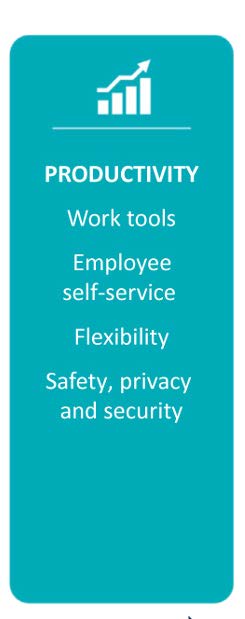
Every organization has made tough decisions in adjusting to the COVID-19 pandemic. Consider them not as crisis management but as foundational steps toward building a better future of work. Take stock of the progress you have made and prioritize the critical steps you must take to build on the momentum built during the pandemic. For every priority and strategy, evaluate how your technology is enabling your evolution. Weigh the need to upgrade your technology or invest in new technology to drive your future-of-work strategies.
Evaluate individual work experiences from the perspective of your employees and develop separate improvement strategies for each one.
Change management is often an afterthought. Make it front and center for each set of changes.
To download a complimentary copy of Brandon Hall Group’s Managing Remotely During Disruption Playbook-Research and Guidance for COVID-19 and Beyond, click here.
Claude Werder is senior vice president of Research Operations and principal Human Capital Management (HCM) analyst at Brandon Hall Group. The firm’s vision is to inspire a better workplace experience, and its mission is to empower excellence in organizations around the world through its research and tools. Brandon Hall Group has five HCM practices and produces the Brandon Hall Group HCM Excellence Awards and the annual HCM Excellence Conference, in West Palm Beach, FL.




